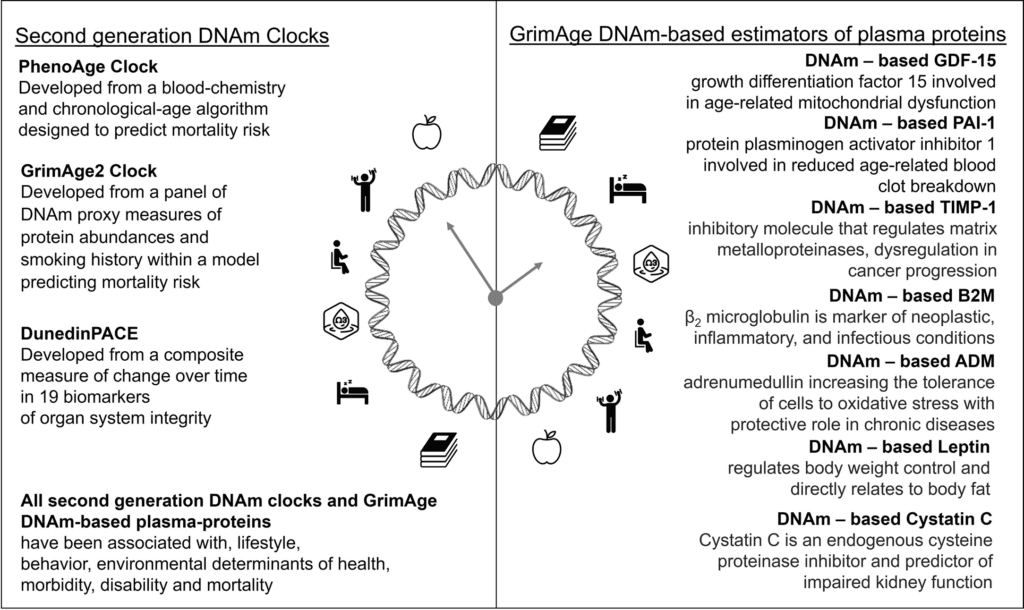The quest for longevity has captivated humans for centuries. While chronological age is a constant march forward, our biological age – the rate at which our bodies are ageing – can be influenced by various factors. Lifestyle choices, including diet, exercise, and supplementation, are increasingly recognised as key players in this intricate process.
A recent study published in Nature Ageing delves into this fascinating area, examining the impact of three crucial interventions – vitamin D supplementation, omega-3 fatty acid intake, and a simple home exercise program – on biological ageing in older adults. This research, conducted within the framework of the DO-HEALTH trial, provides valuable insights into the potential of these interventions to slow down the ageing process at a molecular level.
Understanding Biological Ageing
Before we dive into the study findings, let’s clarify what we mean by “biological ageing.” While chronological age reflects the number of years we’ve lived, biological age reflects the physiological state of our bodies. It encompasses various factors, such as cellular senescence, telomere shortening, and epigenetic changes – modifications to DNA that don’t alter the underlying genetic sequence.
Epigenetic Clocks: Measuring Biological Age
One powerful tool for assessing biological age is through epigenetic clocks. These are algorithms that utilise DNA methylation patterns – chemical tags that attach to DNA and influence gene expression – to estimate an individual’s biological age.
- First-generation clocks primarily predict chronological age.
- Second-generation clocks are more sophisticated, reflecting an individual’s mortality risk.
- Third-generation clocks, such as DunedinPACE, focus on the “pace of ageing” – the rate at which an individual’s biological functions decline.
These clocks provide valuable insights into an individual’s biological age and can be used to assess the impact of interventions aimed at slowing down the ageing process.

The DO-HEALTH Trial
The DO-HEALTH trial was a large-scale, randomised controlled trial involving over 2,157 healthy adults aged 70 and older. Participants were randomly assigned to receive one of eight treatment combinations:
- Vitamin D: 2,000 IU per day https://bit.ly/ZZZinoShine
- Omega-3: 1 gram per day https://bit.ly/ZZOmega
- SHEP (Simple Home Exercise Program): 30 minutes of strength training three times per week
- Combinations of these three interventions
Participants were followed for three years, and researchers assessed various health outcomes, including the impact of the interventions on biological ageing.
Key Findings of the Study
- Omega-3’s Impact: The study found that omega-3 supplementation alone significantly slowed down biological ageing as measured by several epigenetic clocks, including PhenoAge, GrimAge2, and DunedinPACE.
- Additive Benefits: The combination of omega-3 with vitamin D and/or exercise demonstrated additive benefits in slowing down biological ageing, particularly as measured by PhenoAge.
- Stratified Analysis: The study also explored how treatment effects varied based on factors such as sex, age, BMI, vitamin D levels, and baseline omega-3 levels. Interestingly, individuals with lower baseline omega-3 levels appeared to benefit more from the combined interventions.
Implications and Future Directions
This study provides compelling evidence that lifestyle interventions, particularly omega-3 supplementation, can have a positive impact on biological ageing. The finding that the combined effects of omega-3, vitamin D, and exercise may be greater than the sum of their individual effects is particularly encouraging.
However, it’s important to note some limitations:
- Study Population: The study population was relatively healthy and active, which may limit the generalisability of the findings to the broader population of older adults.
- Relatively Short Duration: The three-year follow-up period may not be sufficient to fully assess the long-term impact of these interventions on healthspan and lifespan.
- Focus on Specific Clocks: The study primarily focused on a limited number of epigenetic clocks. Further research is needed to investigate the effects of these interventions on a wider range of biological ageing markers.
Despite these limitations, the DO-HEALTH trial provides valuable insights into the potential of lifestyle interventions to slow down biological ageing and promote healthy ageing. These findings have significant implications for public health, emphasising the importance of incorporating these interventions into our daily lives.
Further Research:
- Longitudinal Studies: Longer-term studies are needed to assess the long-term effects of these interventions on healthspan and lifespan.
- Mechanistic Studies: Further research is required to understand the underlying mechanisms by which these interventions influence biological ageing.
- Personalised Approaches: Tailoring intervention strategies based on individual characteristics, such as baseline nutritional status and genetic predisposition, may further enhance their efficacy.
In Conclusion
The DO-HEALTH trial provides encouraging evidence that lifestyle interventions, particularly omega-3 supplementation, can have a positive impact on biological aging. While further research is needed, these findings highlight the importance of incorporating healthy dietary habits, regular exercise, and appropriate supplementation into our daily routines to promote optimal health and longevity.
This is for informational purposes only. For medical advice or diagnosis, consult a professional.
The exciting findings from the DO-HEALTH trial underscore the potential of lifestyle interventions to positively impact biological ageing. By incorporating key elements like omega-3 fatty acids, vitamin D, and regular exercise into our daily routines, we may not only improve our overall health but also potentially slow down the ageing process at a fundamental level.

To support your journey towards optimal health and well-being, consider exploring Zinzino’s range of high-quality supplements.
Zinzino BalanceOil+, for example, [invalid URL removed] offers a synergistic blend of pure fish oil, rich in omega-3 fatty acids, and extra virgin olive oil, providing a potent source of antioxidants and essential nutrients.
ZinoShine+ is a natural food supplement that combines vegan vitamin D3 in its most bioactive form from wild-harvested lichen, and broad-spectrum magnesium.

Disclaimer: This blog post is for informational purposes only and should not be construed as medical advice. Please consult with a healthcare professional1 before making any changes to your diet or exercise routine.2
References:
- Bischoff-Ferrari, H. A. et al. Effect of vitamin D supplementation, omega-3 fatty acid supplementation, or a strength-training exercise program on clinical outcomes in older adults: the DO-HEALTH randomized clinical trial. JAMA3 324, 1855–1868 (2020).
- Levine, M. E. et al. An epigenetic biomarker of aging for lifespan and healthspan. Aging (Albany NY) 10, 573–591 (2018).
- Horvath, S. DNA methylation age of human tissues and cell types. Genome Biol. 14, R115 (2013).
- Belsky, D. W. et al. DunedinPACE, a DNA methylation biomarker of the pace of aging. eLife 10, 73420 (2022).

